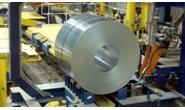Government/Policy

February 8, 2018
EU Issues Dumping Duties on Chinese CORE
Written by Sandy Williams
Corrosion resistant steel imported from China to the European Union has been assigned antidumping duties by the European Commission.
The commission announced Thursday that the duties will range from 17.2 to 27.9 percent, similar to the provisional rates set in August of 17.2 to 28.5 percent.
Eurofer, the EU steelmakers association, petitioned the commission in December 2016 for an investigation after EU steel producers complained that China was selling its CORE at unfairly low prices. China’s market share of corrosion resistant steel doubled from 2013 to 2015, rising from 10 percent to 20 percent.
EURFOR’s Director General Axel Eggert welcomed the final measures imposed by the commission, but warned that a circumvention investigation may be forthcoming.
“The commission has made the right move in combatting dumping from China on this steel product”, said Eggert. “However, we have received reports that Chinese exporters have been misclassifying or transhipping their corrosion resistant steels in order to circumvent legitimate anti-dumping measures.”
“Circumvention is fraud, as is knowingly falsifying customs declarations,” said Eggert. “It undermines the EU’s trade defense tools and represents bad faith on the part of the exporters. EUROFER will work closely with customs authorities and with the European Anti-Fraud Office (OLAF) to ensure the proper enforcement of the measures.”
Chinese officials said China is “strongly discontent” with the unfair treatment of Chinese steel producers by the EU. “The EU still uses data from Brazil to calculate prices and costs of Chinese steel companies to artificially raise their dumping margins,” said Wang Hejun, head of the trade remedy and investigation bureau under the Ministry of Commerce, as quoted by Xinhau. “The EU should fulfill its duty written into the WTO protocol and treat Chinese firms fairly in its trade investigations.”
Wang said that steel overcapacity in a time of shrinking demand is contributing to trade issues. China is willing to work with the EU and others to reduce steel overcapacity. “Hasty trade remedy measures will not help solve the problem,” Wang added.
China has launched a program to cut back steel production capacity by 150 million metric tons by 2020. On Wednesday, the Ministry said it will meet its target two years earlier than planned.








